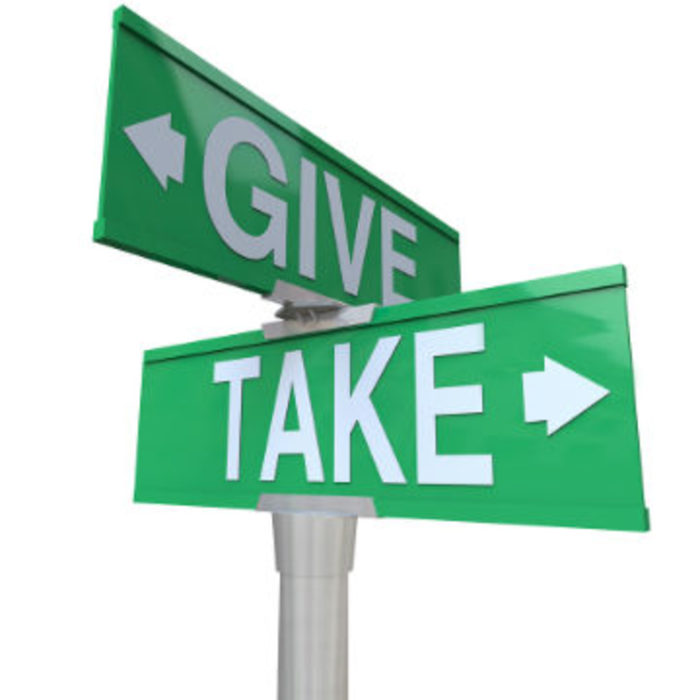Chances are, you’ve thought that the chocolate or mint your waiter brings with your bill, along with a friendly smile, was a kind gesture, right? Wrong—at least in many cases. The Journal of Applied Social Psychology summarized numerous studies showing that this mannerly move is actually a tactic used to get higher tips. How? By tapping into a driving force of human behavior: reciprocity.
Various studies show that when someone does us a favor—stranger or friend—we feel compelled to repay them. When we indulge in free samples at the grocery store, we tend to feel guilty if we don’t buy something. And using a gas station bathroom on a road trip without buying a thing has some of us scurrying quickly out the door. Perhaps it’s part of our survival instinct to “hold our own” or a nurturing instinct to support others on a joint quest to thrive under the same societal rules.
Regardless of what drives our need to reciprocate, it’s a very real and key component of psychology-based marketing: strategies and campaigns founded on psychological principles and behaviors. Decades of research shows that we’re more inclined to do favors for friends who once did something nice for us. When we return the favor, the value of our “payback” is often greater than the original good deed that initiated the act.
Think about your own patterns. Or consider this example: You dog-sat your neighbors’ poodle for 10 days in return for them watching your Shih Tzu for only two days. Somehow you called it even, despite the fact that you got a hyper, yapping dog that’s smart enough to get even by leaving you daily messes for much longer than your neighbor watched your exercise-adverse Shih Tzu. Somehow, I suspect many of you can relate.
The same thing applies in business. When a salesperson offers to throw in a perk upon purchase, like free floor mats with the purchase of a $45,000 car, we’re more likely to buy. Silly, given the $100 value of the free gift compared to the debt of the five-year loan; yet, we do it all the time. Similarly, when a company gives us something nice “just because,” we buy more.
In marketing, the rule of reciprocity rules when it comes to one of the most affordable things a business can do to achieve sales, and secure loyalty. Even a small token that costs you next to nothing can pay huge dividends. In fact, I’ve often wondered why gas stations and convenience stores don’t give away their coffee free with purchase all day, every day to compete with the station across the street. For a free coffee that about a $1.50 value, which costs the station about $0.10, customers are more likely to come in for gas. Plus when they leave, they’re likely to buy something else to “reciprocate.”
There are many things thriving brands do today to trigger reciprocal purchases besides free coffee. Here are some examples:
- Beaver Creek, a ski resort near my home, hands out free hot chocolate when you get off the lift in the cold winter mornings and free, warm chocolate-chip cookies when you come off the mountain at the end of the day. It’s no surprise that guests are loyal to this small but nice resort and return often, despite the fact that there are many other resorts at which they could ski.
- Gluten-free energy bar provider Larabar gives out free Larabars to community groups wanting to offer health fair or educational event attendants goodie bags or free snacks. While I can’t quantify the number of sales associated with this giving program, I can safely state that Larabar is one of the most popular snack-bar brands in the U.S. and beyond.
Reciprocity also works in the “pay-it-forward” context. Research by Cone Communications shows that consumers not only want to know that a brand engages in social responsibility programs, but they also want to know the actual impact of those programs on the intended beneficiaries. One report shows that more than 80% of consumers are more likely to purchase from brands that communicate the direct impacts of these programs than ones that don’t.
As you go about creating new customer engagement programs and direct marketing packages for your brand, look for opportunities to give rather than to get. Whoever makes the first kind gesture, as studies show, tends to gain the most.
| Jeanette McMurtry, principal of e4marketing, is an authority on psychology-based marketing, speaking at business events worldwide. She is a Back by Popular Demand trainer, speaker, and course instructor for the DMA. |








